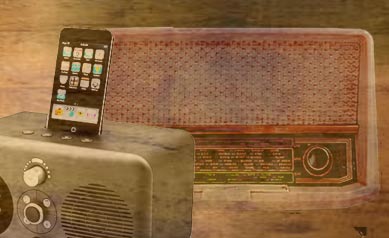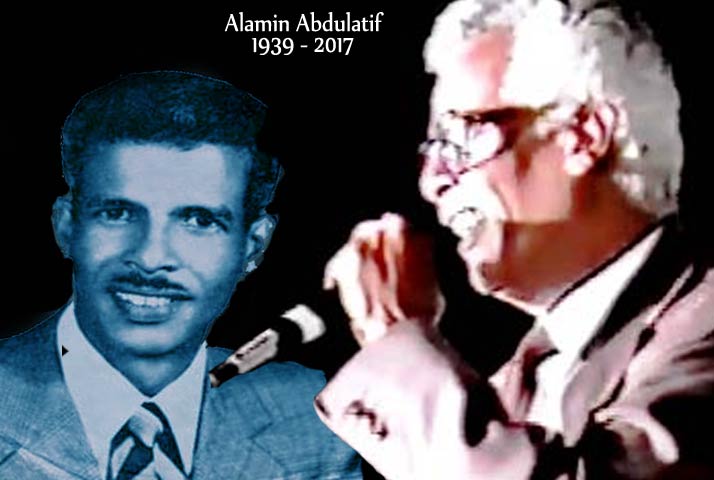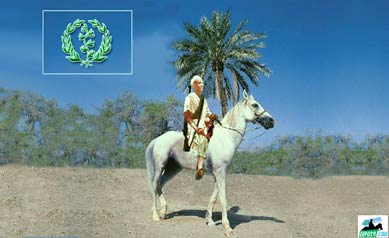De-Politicising A Program is Politics: A Case of Radio Blina

Introduction: Between May 7 and 8, 2016, Eritrean Blen Diaspora will gather in Lausanne, Switzerland for a two-day conference organized by Radio Blina. That is probably a milestone on preserving their endangered language and culture that is exposed to constant exodus and political segregation. The event was initially proposed by Radio Blina listeners to extend their helping hand to the dedicated individuals who worked tirelessly in the radio station—to strength it financially—but it seems much more will be discussed to shape and empower it.
The conference will be held in the morning, and in the evening there will be cultural concert—the conference will wrap-up the next day. “No PFDJ and No opposition” are involved in the organizing of the conference, but Blin language lovers initiated the gathering of Blen people from all over the world, except Eritrea.
So far, the radio and its supporters seem busy creating a politics neutral zone. It’s surprising and very concerning to hear such objectives from a people who are subjected to constant migration due to war, political chaos, social and family disintegration, instability created by oppressors. And ironically, the radio was established by refugees, prime political victims!
It is hard to imagine separate zones for culture and politics, society and politics, prosperity and politics, social harmony and politics. They are all intermingled, hard to ignore one while working on the other. In this context, after a deep contemplation, the author decided to write this article as a thought provoking initiative.
The objective of this article is therefore to share a concern of an individual who belongs to the Blen, a people who were exposed to exodus and political chaos for the last 400 years. It is primarily meant to provoke discussion ahead of the conference. On this occasion the author wishes success for the radio station and expects objective outcomes to be outlined to strengthen the radio in terms of manpower, finance and expansion of coverage.
- Radio Blina: A Glimpse
In November 2014 “Radio Blina” recorded its first youtube broadcast from North America; the initiative was started by three admirable volunteers who reside in the USA: Noredin Natabay, Oqbaselasie Mesghna and Sami Gergis.
According to informal information I have, Radio Blina is dedicated in preserving the language and culture of Blen people and so far, it broadcasts “strictly non-political” program, mainly targeting Diaspora Blen community. According to information I gathered from its youtube channel (Radio Blina), stream length varies from one hour to one hour and forty minutes. Since its birth, it has consistently stayed online streaming its program every Saturday. In order to highlight its achievements, I have conducted a basic research of the last six-months (see table below) and found that it had 3896 visitors and a stream length of 1 hour and 8 minutes on an average.
| Date | Listeners | Length | Remark |
| 23/04/2016 | 2220 | 01:06:31 | Recent broadcast. Visitors expected to increase till the next broadcast. |
| 16/04/2016 | 3282 | 01:06:10 | |
| 09/04/2016 | 4321 | 01:18:54 | |
| 02/04/2016 | 4424 | 01:04:03 | |
| 26/03/2016 | 4128 | 01:02:30 | |
| 19/03/2016 | 4193 | 01:08:06 | |
| 12/03/2016 | 4128 | 01:09:06 | |
| 05/03/2016 | 3995 | 01:00:06 | |
| 27/02/2016 | 3709 | 01:12:51 | |
| 20/02/2016 | 4434 | 01:04:01 | |
| 13/02/2016 | 3617 | 01:11:31 | |
| 06/02/2016 | 4267 | 01:21:01 | |
| 30/01/2016 | 4527 | 01:00:31 | |
| 23/01/2016 | 4659 | 01:03:59 | |
| 16/01/2016 | 4696 | 01:11:31 | Maximum visitors registered |
| 09/01/2016 | 3620 | 01:03:01 | |
| 02/01/2016 | 4600 | 01:19:58 | |
| 26/12/2015 | 3116 | 01:08:11 | |
| 19/12/2015 | 4090 | 01:10:06 | |
| 12/12/2015 | 4299 | 01:08:06 | |
| 05/12/2015 | 3307 | 01:00:59 | |
| 28/11/2015 | 2983 | 01:10:23 | |
| 21/11/2015 | 3369 | 01:02:36 | |
| 14/11/2015 | 3329 | 01:06:37 | |
| 07/11/2015 | 3596 | 01:02:31 | |
| 31/10/2015 | 4385 | 01:37:01 | Longest recorded stream |
| Total Streaming | 26 (6 months) | ||
| Average Listners | 3896 | ||
| Average Stream Length | 01:08:52 |
Source: Radio Blina youtube Channel (visited on 26/04/2016)[i]
Note: Number of visitors is subjected to change as the record is available to visitors all time.
We can learn from the above information that Radio Blina is popular among Diaspora Blen Communities. Comparing the total population of Blen (about 115,000, as per the 2010 report), 3896 visitors (3.4%) might seem insignificant. However, this number represents people living across the globe–Australia to the USA, New Zealand to Canada and Norway. This implies dispersed Bilen communities are connected via the radio. In addition, it has an accessible archive with primary teaching resources for perpetuity, providing unadulterated Blin dialect.
- Blin as an Endangered Language and its Historical Anecdotes
When people are uprooted from their natural habitat, their values, identities, languages, cultures, pride and dignity face tremendous challenges for survival; they often face difficulties and sometimes they succumb to pressures and become extinct; only in rare instances do the people overcome such problems. The Blen, their language and collective identity are in dire situation and the dispersed people passionately struggling to safeguard their identity, for different reasons.
In the world of globalization, languages and cultures are becoming extinct. And though the Blin language is not among the endangered languages, circumstances and migration are putting great pressure on maintaining its dialectical purity and vocabulary preservation.
Due to the continuous onslaught by Ethiopian feudal warlords, followed by the Eritrean ruling regime, the PFDJ, the people are leaving homes in unprecedented numbers—in an exodus unmatched in history except in the 16th century.
Blen people have very controversial history; a widely accepted narration states that in the 16th century the Blen people immigrated to Eritrea from Agow-Lasta of central Ethiopia where they have kinships still living there[ii]. Other oral tradition says, “Blen people were original settlers of the highland of today’s Eritrea. Through time they migrated to today’s central Ethiopia and were able to establish great kingdoms. After a time, they lost their central power and immigrated to their original land”.
These above anecdotes give us an overview of delicate insight into “migration” which forces people to be exposed to different cultures and religious practices. Today, it is not a surprise to find members of one-family adhering to different religions and speaking different languages.
- The Exodus of The Blen People
The last 50 years were not easy for the Bilen society, they were challenging. Due to the thirty-years of war with Ethiopia that is now followed by the ruthless PFDJ administration, the Blen faced massive exodus which resulted in breaking up of family links in scattered settlements. Depending on the nature of push factor and its challenges, the waves of migration can be divided into two:
- First Waves of migration and Challenges – 1960s to 1980s
When Ethiopia started burning villages and massacring their inhabitants, the Blen people were its first victims—such as the villages of Ona and Besigidira that were burned and their people massacred. Due to these horrific tragedies, families started to flee their homes and the villages were abandoned. Refugee camps were established in in the Sudan which became their new settlements. A few lucky families were resettled in, Australia, Sweden, Norway and Canada.
Those who continued to live in the refugee camps experienced difficulties in preserving their culture and language because of the daily challenges of life. As a result, families were forced to send their children to schools whose medium of instruction was Arabic. However, families stayed together and that gave them a limited advantage of using their language at home.
The other group of emigrants who went far away from home and settled in a completely new environment faced unique challenges: new language and culture. Because of daily work and limited contact with their children, not only their culture but also their native language was at risk.
- Second Waves of Migration and Challenges – 2000 to present
While Bilen people were living under historical trauma of mass migration and social pressure, since the year 2000 they have been experiencing a type of migration due to lack of freedom and forced conscription. The new situation is more worrisome because unlike in the past, were entire families and villages were fleeing, today it’s the youth who are fleeing as individuals. Horrified by indefinite military service and exposure to systematic torture and crimes, the young people are escaping to unknown destinations. And unlike in the past, the do not stop at the refugee camps but continue their journey through the Sahara Desert, crossing the Mediterranean Sea and then scattering all over Europe—a journey of three to four years including the asylum processing time. The difficult journey causes them severe anxiety and trauma. The majority being young and single, they are exposed to all forms of identity erosion. Because of their horrible experience under the PFDJ administration, their politics is terrifying, and is often a taboo subject—they have been exposed to constant brainwashing that forces them to shun politics. The impact of such tendencies is easily observable in their social interactions and the initiatives they take for their social gathering.
Blen People and their Role in Eritrean Politics
Based on their centuries old history, the downfalls and retreats they faced have affected their capability to protect themselves. Their exodus from central highlands of Ethiopia was due to their losing power and weakness to protect themselves. Even when they settled in their present territory, their capability to defend themselves remained weaker. For example, in his booklet Michael Gabir[iii] puts it as follows:
“ብሊን ሓደ ጥሙር ኣመሓዳድራ ኣይነበሮምን፤ ብሓድነት ንጸላእቶም ብዘይምምካቶም ከኣ ብዙሕ ይጉድኡ ነይሮም። ኣብ ውሽጢ’ዚ ኣብ ላዕሊ እተጠቕሰ ግዜ እቲ ከባቢ ብግብጻውያንን ገዛእቲ ትግራይን ይጭነቕ ነበረ። ብ1863 ዓም 12 ዓድታት በጎስ ብወረርቲ ሓይልታት ነዲደን። ብ 1865 ዓ.ም. ዓበይቲ ዓዲ ተኣኪቦም ዕቑባ መንግስቲ እንግሊዝ ክሓቱ ወሲኖም።”
With the arrival of the Italian colonizers, the resistance of the Blen people was not strong. Their adoption of Catholicism could be a possible reason of conformity and inability to safeguard the status quo. With the beginning of the British administration and their ‘divide and rule policy’, the Blen were exposed to kinship confrontation. They claimed their family tree (Terke, Tawke and 12 Neged) as a main source of social division among themselves.
Such developments led to the weakening of the social cohesion of the Blen and their ability to protect their common interests in unison. The impact of such disintegrations was prevalent throughout the armed struggle and continues now under the PFDJ rule.
During the struggle era (1961- 1991), the majority of Blen fighters were members of ELF and they gained a reputation as being loyal members. When ELF was defeated and left the field, Blen fighters were the first victims of political assassination and forced exile. Known ex-members of the ELF became vulnerable. Consequently, the Blen elite fled away, far from home.
Resettlements and Opportunities
Because of deep connection with their traditions, once displaced from their original land, life for the refugees becomes challenging. It usually starts with cultural shock, nostalgia, alienation, depression, and anxiety. Communication problems often causes deep stress. To counter such difficulties, they resort to finding immediate solutions by building quick social connections to expand their networks.
Before the independence of Eritrea, most of the time families had limited opportunity to be connected; that weakened their cultural ties but they kept striving to keep their language intact. Limited to occasional community gathering which had a positive impact in keeping them connected, their area-specific situation kept them confined and unable to exercise their culture.
However, the new wave of migrants started to resettle and enjoy new opportunities. Most of them being millennials, they were quick to adopt modern communication systems to stay closer to each other and they use social media extensively–Facebook, youtube, paltalk, viber, whatsup, imo, etc. There are also websites catering to the Blen people and their history: such as daberi.org and bilenbogos.weebly.com.
Despite their wide use of social media, they seem avoid delving into politics; almost all focus on language and culture. There could be acceptable reasons that keeps them spending their energy these issues. Experiencing centuries old political trauma and instability indeed these people have been vulnerable to social catastrophe, cultural erosion and endangering the survival of their spoken language[iv].
Needless to say, the main source of these dangers is absence of political accommodation and the presence of a repressive system of governance in their ancestral country. The best solution to reclaim their dignity could have been strengthening their political involvement while at the same time working on preserving their language and culture. Nevertheless, so far, all initiative seems to be discouraging political participation. For example, since its birth, Radio Blina is working under a program theme “Politics free zone”. Such position is the worst kind of politics because it ignores the political situation and the social crisis of its victimized target group.
De-Politicised Programs: An Impact of Political Trauma
Looking at the social demography of the Blen people, we find that it encompasses hibernating clan conflicts due to the instability of the past, and failures in building a common political platforms and the difficulties of the current political landscape. In addition, due to the PFDJ’s political system and the constant brainwashing it applies on the people, politics is often treated as foreign issue, a taboo subject the people are afraid to discuss. The impact of such fear has extended to every social media.
the indirect political agenda of the PFDJ is to create a society free of politics. Eritrean community centres established under direct PFDJ supervision have one mandatory criteria: “members who join such communities must drop their own politics.” At any rate, depoliticized programs are by themselves politics. And it is hard to separate politics from daily life and it becomes harder when the target group are themselves victims of politics. Any program claiming to be free of politics is an excuse that is far from reality—unless its politics is to depoliticize the people.
Conclusion
Eritreans, including the Blen people, are victims of colonization, Ethiopian aggression, and worse, the PFDJ rule. The basic social structure of the Blen is deteriorating, probably nearing a state of endangered society and their culture and language is facing catastrophe. In light of that, the Blen are taking important initiatives to preserve their identity and Radio Blina is born to ameliorate such a situation. However, though the idea and dedication is commendable, keeping the radio program free of politics is not a good idea.
During the coming weekend, the Radio Blina conference will be underway in Lausanne, Switzerland, it’s a milestone for the future politics of the Blen people. The author hopes the conference will reconsider the mission and objectives of Radio Blina so that its program reflect the real situation of the Blen people. If not, a program that is contrary to the reality is valueless and non-representative. Importantly, the worst politics is shying away from politics. For this reason, the author wishes that the objective outcome of the conference will be targeting the salvaging the dignity and values of the Bilen people.
[i] Radio Blina Youtube channel
[ii] M. Gabir, መበቆልን ሕብረተሰባዊ ርኽክብንስ ህዝቢ ብሌን, 1992
[iii] Idib
[iv] Wikipedia, “Endangered Language“



Awate Forum